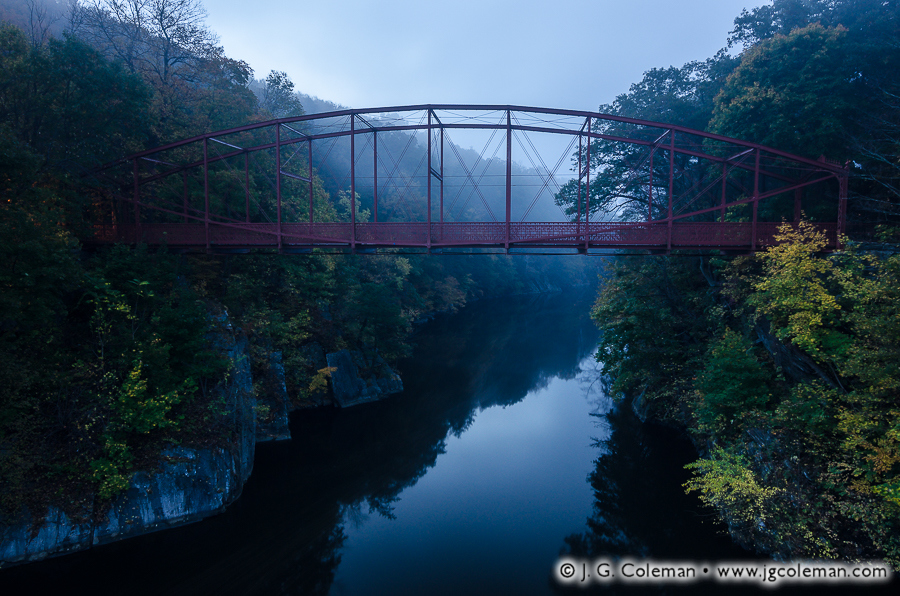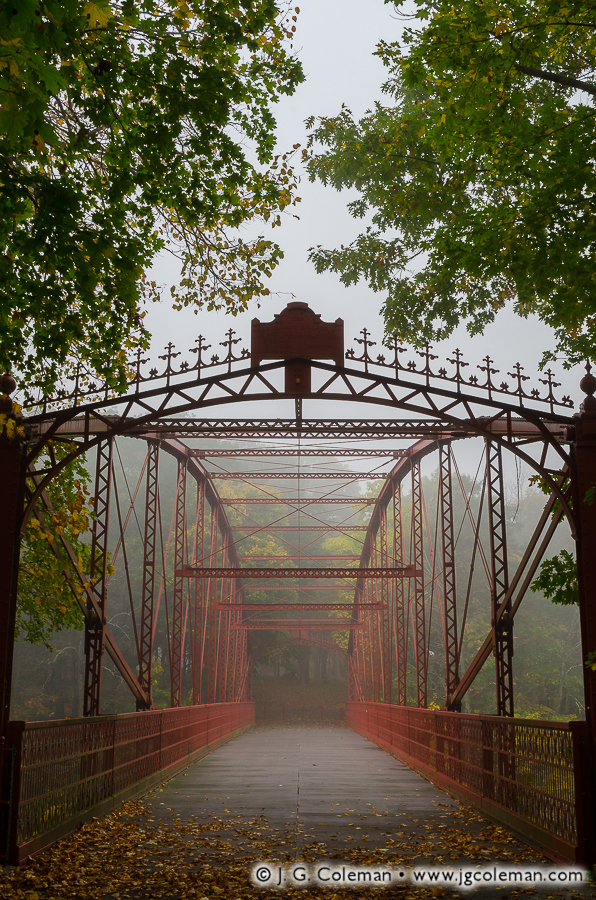
Lovers Leap Iron Bridge over the Housatonic River in Lovers Leap State Park,
New Milford, Connecticut
© 2015 J. G. Coleman
During early autumn last year, I had the great pleasure of arriving at Lovers Leap State Park in New Milford, Connecticut on a warm, misty morning well before dawn. My newly-released piece, “Iron Ghost on the Housatonic”, was certainly my favorite from that dream-like riverscape along the Housatonic River.
The Lovers Leap Bridge, which is silhouetted in the faint twilight over the river gorge, has faithfully spanned the Housatonic since its construction back in 1895. Iron bridges such as these hit the market in the late 1800s and they were oftentimes the “high tech” replacements for older wooden covered bridges. Both bridge designs are rather antiquated these days, even if they were celebrated in their respective eras as marvels of engineering.
The 160-acre Lovers Leap State Park certainly drew its name from the bridge… and the bridge, in turn, drew its name from an old legend which suggests that a Native American girl named Lillinonah, overcome with distraught over a lost lover, leapt to her death here in the Housatonic River. One version of the tale suggests that the heart-broken lover jumped from a 1200-foot mountainous promontory in the heart of the park. But an alternate rendition holds that she threw herself from the precipice of the gorge where one of the abutments for the Lovers Leap Bridge would later be constructed.

Lovers Leap Iron Bridge over the Housatonic River in Lovers Leap State Park,
New Milford, Connecticut
© 2015 J. G. Coleman
Before I wrap up this post, though, I wanted to satiate the curiosity of the rare individual out there who will look at the mirror-smooth waters of the Housatonic River in my photograph (at top) and wonder,” How in the world could somebody perish by jumping into such a tame river?”
Fair enough… the Housatonic River doesn’t exactly look dangerous, does it? But to make sense of the story, we must consider the context of the tale. We know for certain that Lillinonah’s father, Chief Waramaug, died an old man around 1735. So, although we don’t know when exactly the Chief fathered Lillinonah, it’s probable that her tragic end took place somewhere between the 1690s and 1730s. Back then, the Housatonic River still ran wild through New Milford and surrounding lands in deep, precipitous gorges, churning with whitewater as it weaved down through the highlands. Snow melts and heavy rains could produce impressive and deadly displays as the river furiously crashed through its woodland gorges and threatened to flood.
It wasn’t until 1955 that a dam was constructed several miles downstream, impounding the Housatonic River all the way back up into New Milford. Suffice it to say, the placid stretch of river that you can see beneath the Lovers Leap Iron Bridge in my piece, “Iron Ghost on the Housatonic”, would’ve been raucous, swift-flowing rapids in the early days when Lillinonah took her fateful plunge.
Purchase a Fine Art Print or Inquire About Licensing
Click here to visit my landing page for “Iron Ghost on the Housatonic” to buy a beautiful fine art print or inquire about licensing this image.
Want to See More?
Be sure to check out all of my work from Lovers Leap State Park and the Lovers Leap Iron Bridge.

